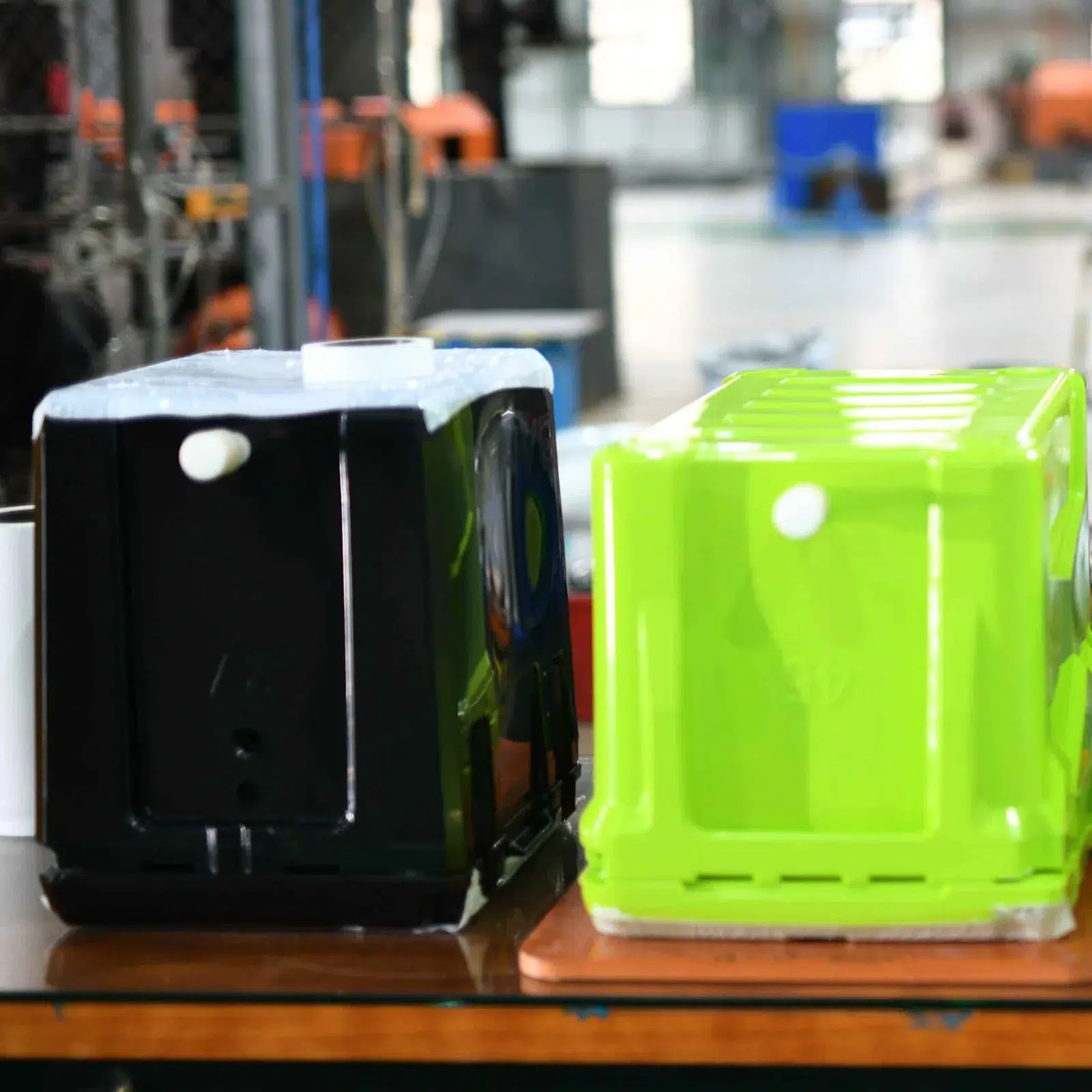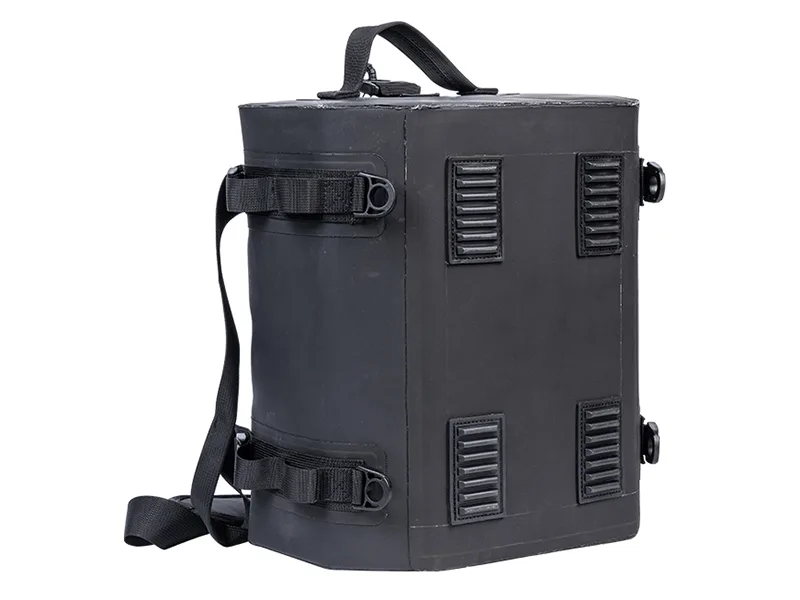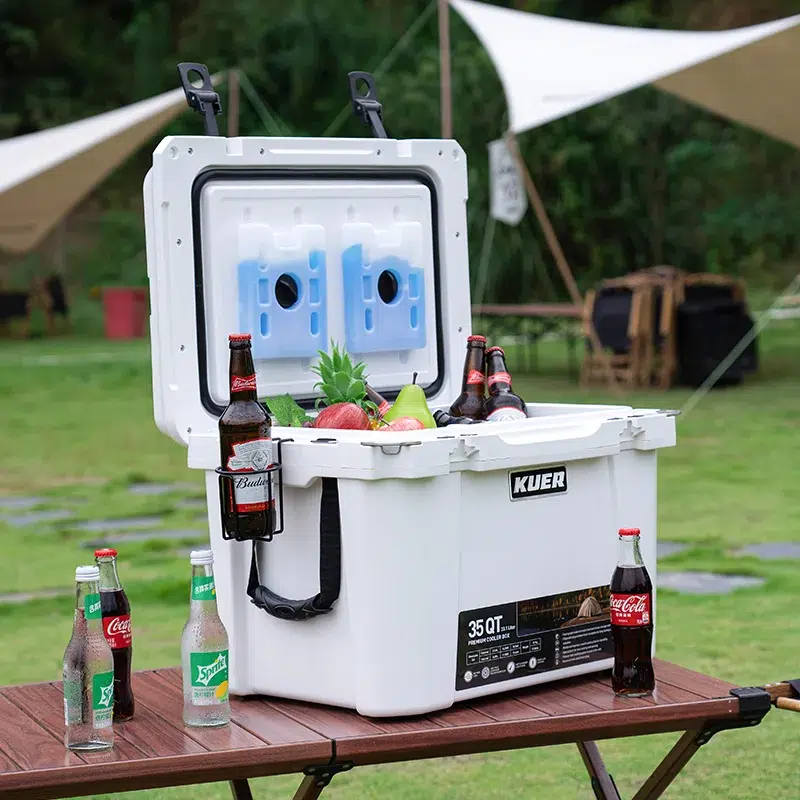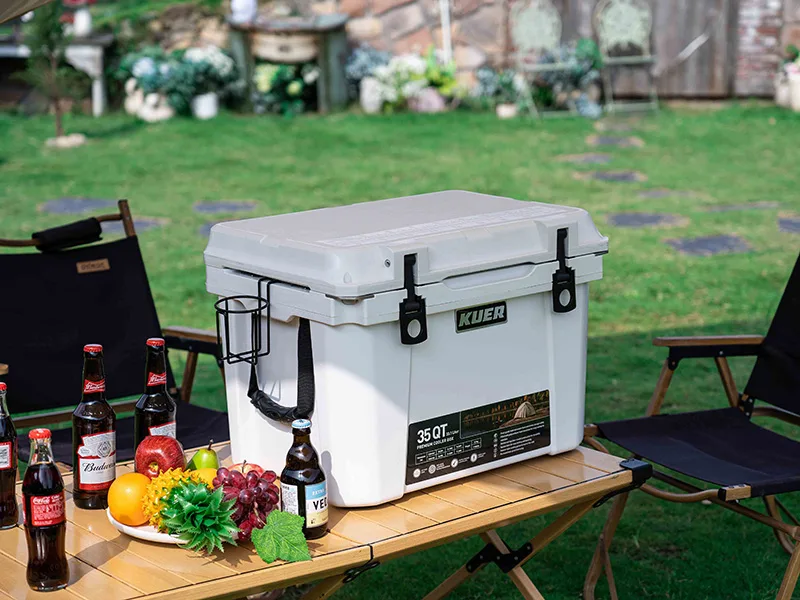
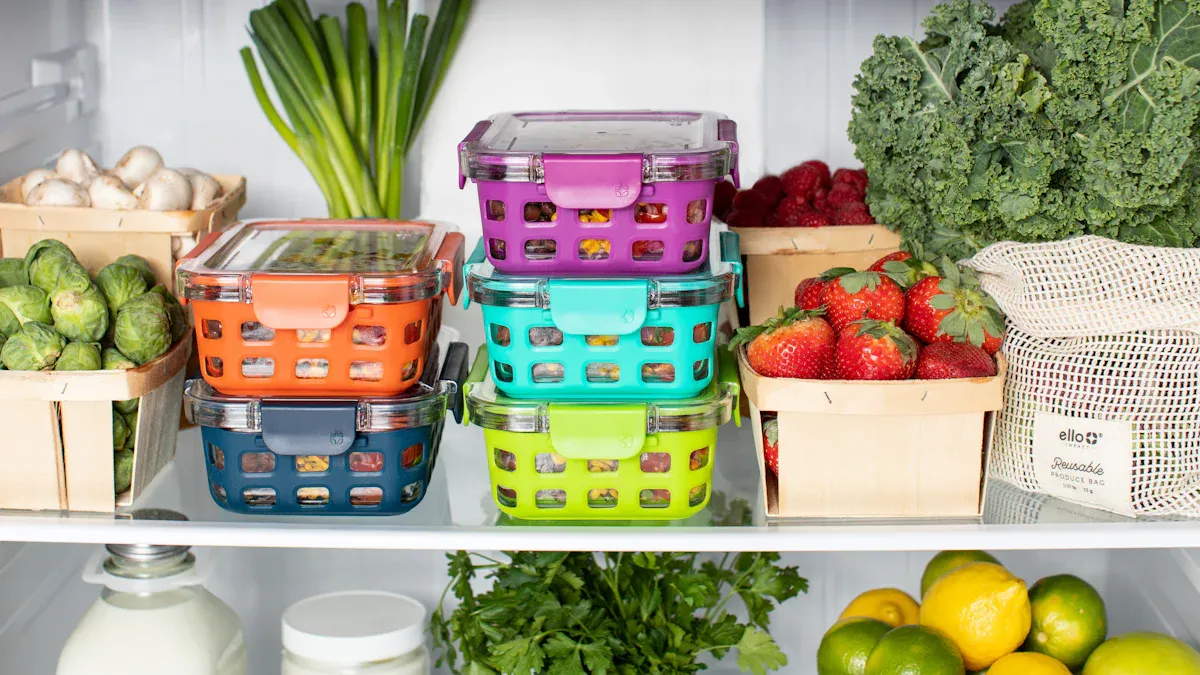
When it comes to keeping your food fresh, Yeti and RTIC stand out as two of the best options on the market. Yeti coolers are famous for their premium insulation and rugged design, making them a top choice for outdoor enthusiasts. On the other hand, RTIC insulated cooler box delivers competitive performance at a price that’s easier on your wallet. For instance, the Yeti Roadie 48 can keep temperatures below 40°F for up to 6.7 days, while RTIC coolers are celebrated for their affordability and solid insulation. Whether you’re after the best hard lunch cooler for a picnic or a camping trip, the Yeti vs RTIC debate often comes down to your priorities—performance or price.
Insulation Performance
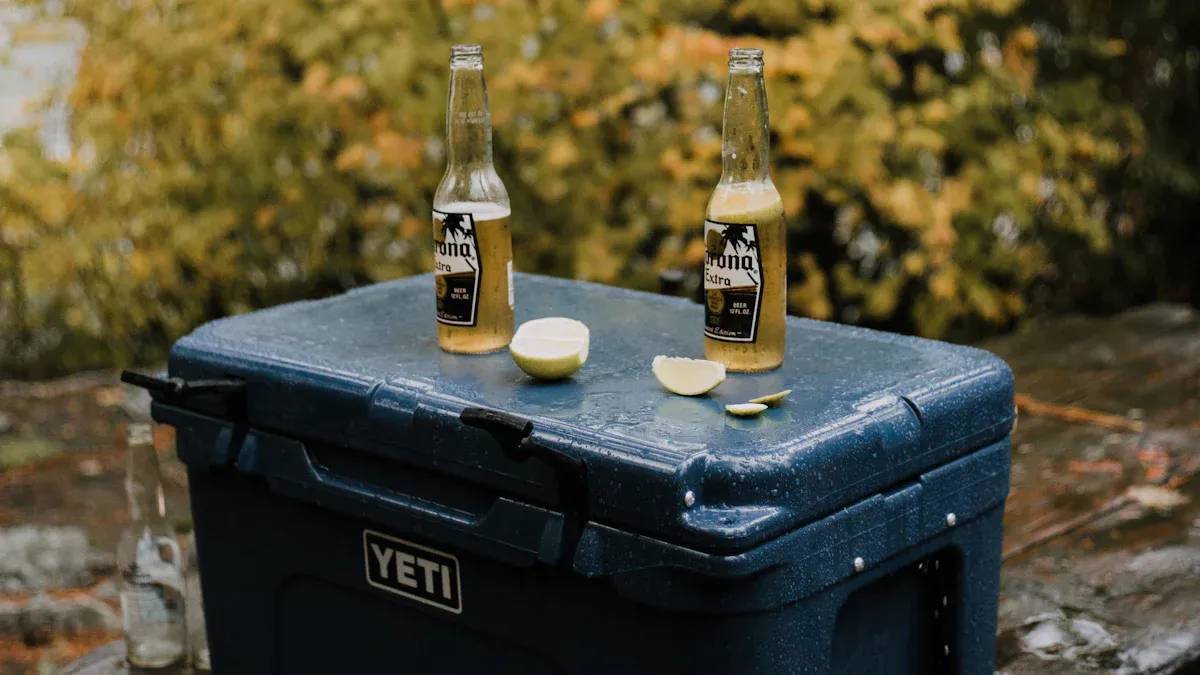
Insulation Technology
Yeti’s Insulation Features
Yeti coolers are known for their advanced insulation technology. They use rotomolding, which creates thick, uniform walls filled with high-density polyurethane foam. This design forms a strong thermal barrier, keeping your food and drinks cold for days. Yeti coolers also feature heavy-duty rubber gaskets that create an airtight seal, locking in the cold. Their soft-sided coolers, like the Yeti Hopper, incorporate closed-cell foam and reflective liners to enhance insulation performance. These features make Yeti coolers a top choice for those who prioritize long-lasting temperature control.
RTIC’s Insulation Features
RTIC coolers also utilize rotomolding technology, ensuring durability and excellent insulation. Like Yeti, RTIC coolers are filled with high-performance polyurethane foam, which significantly improves ice retention. The RTIC SoftPak series, for example, uses closed-cell foam insulation and leak-proof zippers to maintain cold temperatures. These soft-sided coolers are designed to compete directly with Yeti’s Hopper series, offering similar insulation performance at a more affordable price.
Temperature Retention
How Long Yeti Keeps Food Fresh
Yeti coolers excel in temperature retention. For instance, the Yeti Roadie 48 can maintain temperatures below 40°F for up to 6.7 days, making it ideal for extended trips. The Yeti Hopper series also performs well, with the Hopper 30 retaining ice for 3.5 to 4 days. This level of performance ensures your food stays fresh, even in challenging conditions.
How Long RTIC Keeps Food Fresh
RTIC coolers offer impressive temperature retention as well. The RTIC SoftPak 30 matches the Yeti Hopper 30, keeping ice for 3.5 to 4 days. While RTIC coolers may not match Yeti’s premium models like the Roadie 48, they still provide excellent performance for their price. This makes them a great option for budget-conscious buyers who need reliable cooling.
Real-World Performance
User Experiences with Yeti
Many users praise Yeti coolers for their exceptional insulation performance. In real-world tests, the Yeti Hopper 20 kept ice for approximately three days, even in warm conditions. Customers often highlight the durability and premium feel of Yeti’s soft-sided coolers, making them a favorite for outdoor adventures.
User Experiences with RTIC
RTIC coolers also receive positive feedback for their insulation capabilities. The RTIC SoftPak 20, for example, matches the Yeti Hopper 20 in ice retention, lasting around three days. Users appreciate the affordability of RTIC coolers, noting that they deliver comparable performance to Yeti at a fraction of the cost. This balance of quality and price makes RTIC a popular choice for many.

Durability and Build Quality
Materials Used
Yeti’s Build Quality
Yeti coolers are built to last, and their design and construction reflect this commitment. They use high-end materials like rotomolded polyethylene, which is the same material used in whitewater rafts. This makes them incredibly tough and resistant to impacts. The insulation consists of closed-cell foam, which not only keeps your food cold but also adds structural integrity. Yeti coolers also feature heavy-duty zippers, reinforced handles, and water-resistant bases. These components ensure that the cooler can handle rough outdoor conditions without compromising performance.
RTIC’s Build Quality
RTIC coolers are no slouch when it comes to durability. Like Yeti, RTIC uses rotomolded construction for their hard-sided coolers, ensuring excellent impact resistance. Their soft-sided coolers feature puncture-resistant fabrics and leak-proof seams, making them ideal for outdoor adventures. RTIC also incorporates closed-cell foam insulation, FDA-approved food-grade linings, and heavy-duty zippers. These features make RTIC coolers a reliable choice for those who want durability without breaking the bank.
Resistance to Wear and Tear
Yeti’s Durability in Outdoor Conditions
Yeti coolers are designed to withstand extreme conditions. Whether you’re dragging them across rocky terrain or using them as a makeshift seat, they hold up remarkably well. Tests have shown that Yeti coolers can endure being dropped, rolled, and even used as step stools without showing significant wear. The rugged construction and premium materials make them a favorite among outdoor enthusiasts who need gear they can rely on.
RTIC’s Durability in Outdoor Conditions
RTIC coolers also perform well under tough conditions. They’ve been tested for resistance to punctures, impacts, and general wear and tear. While they may not match Yeti’s premium build, RTIC coolers still offer impressive durability for their price. Their reinforced handles and sturdy bases make them suitable for camping, fishing, and other outdoor activities. If you’re looking for a cooler that balances durability and affordability, RTIC is a strong contender.
Longevity
How Long Yeti Coolers Last
Yeti coolers are built for the long haul. Many users report using their Yeti coolers for years without any significant loss in performance. The high-quality materials and robust design ensure that these coolers can handle repeated use in harsh environments. Whether you’re on a week-long camping trip or a day at the beach, Yeti coolers deliver consistent performance, making them a worthwhile investment.
How Long RTIC Coolers Last
RTIC coolers also offer good longevity, especially considering their price point. While they may not have the same reputation as Yeti for surviving extreme conditions, they still hold up well under regular use. RTIC coolers are a great option if you want a durable product that doesn’t require a premium price tag. With proper care, an RTIC cooler can serve you well for years.

Price and Value
Price Comparison
Yeti’s Price Range
Yeti coolers are known for their premium quality, but that comes with a higher price tag. For example, the Yeti Hopper 20 typically costs 250-310% more than its RTIC counterpart, the RTIC SoftPak 20. Similarly, the Yeti Hopper 30 and Hopper 40 models are priced 230-290% and 220-270% higher, respectively. This significant price difference reflects Yeti’s focus on top-tier materials and advanced features. If you’re looking for the best lunch box cooler and don’t mind paying extra for premium performance, Yeti coolers might be worth considering.
RTIC’s Price Range
RTIC coolers, including the RTIC SoftPak series, offer a more budget-friendly alternative. The RTIC SoftPak 20 starts at $109.99, while the SoftPak 30 and SoftPak 40 are priced at $134.99 and $164.99, respectively. These prices make RTIC a strong contender for those who want reliable cooler options without breaking the bank. With RTIC, you get a quality product at a fraction of the price of Yeti, making it an attractive choice for budget-conscious buyers.
| Cooler Model | RTIC MSRP | Approximate Premium for Yeti |
|---|---|---|
| RTIC SoftPak 20 vs. Yeti Hopper 20 | $109.99 | 250-310% |
| RTIC SoftPak 30 vs. Yeti Hopper 30 | $134.99 | 230-290% |
| RTIC SoftPak 40 vs. Yeti Hopper 40 | $164.99 | 220-270% |
Value for Money
Is Yeti Worth the Premium Price?
Yeti coolers deliver exceptional performance, but are they worth the premium? If you prioritize durability, advanced insulation, and long-term reliability, Yeti might justify its cost. For instance, the Yeti Hopper series offers unmatched ice retention and rugged construction. These features make it ideal for outdoor enthusiasts who demand the best lunch box cooler for extended trips. However, if you’re only using your cooler for short outings, the price difference may not feel justified.
Does RTIC Offer Better Value?
RTIC coolers, particularly the RTIC SoftPak series, excel in offering bang for buck. They provide comparable insulation and durability to Yeti at a much lower price. Many users find that RTIC’s performance-to-price ratio makes it a smarter choice for everyday use. While it may lack some of Yeti’s premium features, RTIC still delivers a quality product that meets most needs without the hefty price tag.
- The RTIC SoftPak series is praised for its affordability and solid performance.
- Models like the RTIC SoftPak 30 rival the Yeti Hopper 30 in insulation but cost significantly less.
- For budget-conscious buyers, RTIC coolers strike the perfect balance between cost and functionality.
Budget Considerations
Best Choice for Budget-Conscious Buyers
If you’re watching your wallet, RTIC coolers are the way to go. The RTIC SoftPak series offers excellent size and capacity options at a fraction of the price of Yeti. Whether you need a compact cooler for lunch or a larger one for a weekend trip, RTIC has you covered. Its affordability doesn’t compromise on performance, making it a standout in any cooler buying guide.
Best Choice for Premium Features
For those who want the best of the best, Yeti coolers are hard to beat. The Yeti Hopper series combines advanced insulation, rugged durability, and sleek design. If you’re after premium features and don’t mind the investment, Yeti is the ultimate choice. It’s perfect for outdoor adventures where reliability and performance are non-negotiable.
Overall Recommendation
Best for Insulation
When it comes to insulation, Yeti stands out as the best soft cooler for keeping your food and drinks cold for extended periods. The Yeti Hopper series, like the Hopper 30, uses advanced closed-cell foam insulation and airtight zippers to lock in the cold. Independent tests show that the Yeti Tundra 45 can retain ice for up to 10 days, with interior temperatures staying as low as 27.3°F after 48 hours. This makes Yeti the go-to choice for long trips or situations where maintaining freshness is critical.
RTIC coolers, including the RTIC SoftPak series, also perform well in insulation. The RTIC SoftPak 30 matches the Yeti Hopper 30 in ice retention, keeping ice for 3.5 to 4 days. While RTIC may not match Yeti’s premium models like the Tundra 45, it still offers solid insulation performance at a fraction of the cost. If you need reliable cooling for shorter outings, RTIC is a strong contender.
Best for Durability
Yeti coolers are built to last. The Yeti Hopper series features rugged materials like rotomolded polyethylene and puncture-resistant fabrics. These coolers can handle rough outdoor conditions, whether you’re camping, fishing, or hiking. Long-term tests show that Yeti coolers maintain their performance even after years of use. If durability is your top priority, Yeti is the clear winner.
RTIC coolers, including the RTIC SoftPak series, also offer impressive durability. They use reinforced seams and heavy-duty zippers to withstand wear and tear. While RTIC may not match Yeti’s premium build quality, it still provides excellent durability for its price. For everyday use or less demanding adventures, RTIC coolers are a reliable choice.
Best for Value
If you’re looking for the best soft cooler that balances performance and price, RTIC takes the crown. The RTIC SoftPak series delivers comparable insulation and durability to the Yeti Hopper series but at a much lower cost. For example, the RTIC SoftPak 30 costs $134.99, while the Yeti Hopper 30 is priced 230-290% higher. This makes RTIC the ideal choice for budget-conscious buyers who want quality without overspending.
However, if you’re willing to invest in premium features, Yeti coolers are worth the price. The Yeti Hopper series offers unmatched insulation, durability, and sleek design. For outdoor enthusiasts who demand the best, Yeti is the ultimate choice.
Final Verdict: Yeti or RTIC?
So, which cooler should you choose in the yeti vs rtic debate? It really depends on what matters most to you—performance, durability, or budget. Let’s break it down.
If you’re someone who values top-notch insulation and rugged durability, Yeti coolers are hard to beat. They’re built to handle extreme conditions, whether you’re camping in the wilderness or spending a day at the beach. Yeti’s advanced insulation technology ensures your food and drinks stay cold for days, making it a reliable choice for long trips. Plus, their premium materials mean these coolers can take a beating and still perform like new. For outdoor enthusiasts who demand the best, Yeti is worth the investment.
On the other hand, RTIC coolers shine when it comes to value. They offer solid insulation and durability at a fraction of Yeti’s price. If you’re looking for a cooler that performs well without emptying your wallet, RTIC is a fantastic option. Their coolers are designed to compete directly with Yeti, and they do a great job of delivering comparable performance. Whether you need a cooler for a picnic or a weekend getaway, RTIC provides a budget-friendly solution that doesn’t skimp on quality.
In the rtic vs yeti showdown, the choice boils down to your priorities. If you’re after premium features and don’t mind paying extra, go with Yeti. But if you want great performance at a more affordable price, RTIC is the way to go. Either way, you’re getting a cooler that keeps your food fresh and your drinks cold.
Choosing between Yeti and RTIC coolers boils down to your priorities. Yeti offers top-notch insulation and durability, making it perfect for those who need reliable performance in extreme conditions. Its premium features justify the higher price if you’re an outdoor enthusiast. On the flip side, RTIC provides excellent value, offering solid insulation and durability at a fraction of Yeti’s cost. If budget is a concern, RTIC is a smart choice without compromising much on quality.
Consider these points:
- Yeti: Exceptional cooling, akin to the NZXT Kraken 240, known for maintaining low temperatures.
- RTIC: Offers great value, similar to the ARCTIC Liquid Freezer III 360, praised for its thermal performance and affordability.
Ultimately, whether you choose Yeti or RTIC, both keep your food fresh and drinks cold. Pick the one that aligns with your needs and budget.
FAQ
1. Which cooler is better for long camping trips?
If you’re planning a long camping trip, Yeti coolers are your best bet. Their advanced insulation can keep food fresh for up to 6.7 days. RTIC coolers are great for shorter trips, offering solid performance at a lower price.
Tip: For extended adventures, choose Yeti for its unmatched temperature retention.
2. Are RTIC coolers as durable as Yeti?
RTIC coolers are durable but don’t quite match Yeti’s rugged build. Yeti uses premium materials like rotomolded polyethylene, making it ideal for extreme conditions. RTIC offers excellent durability for everyday use, especially at its price point.
Note: For rough outdoor use, Yeti’s durability is worth the investment.
3. Do Yeti and RTIC coolers come with warranties?
Yes, both brands offer warranties. Yeti provides a 5-year warranty on most products, while RTIC offers a 1-year warranty. This reflects Yeti’s confidence in its premium build quality.
| Brand | Warranty Duration |
|---|---|
| Yeti | 5 Years |
| RTIC | 1 Year |
4. Which cooler is better for budget-conscious buyers?
RTIC coolers are the go-to choice if you’re on a budget. They deliver reliable insulation and durability at a fraction of Yeti’s cost. You’ll get great value without sacrificing much on performance.
Emoji Tip: 💡 Save money without compromising quality—RTIC is your friend!
5. Can I use these coolers for hot food?
Yes, both Yeti and RTIC coolers can keep food warm. Their insulation works for both hot and cold items. Just preheat the cooler with warm water before adding your food for better results.
Pro Tip: Use towels to wrap hot food for extra heat retention.

